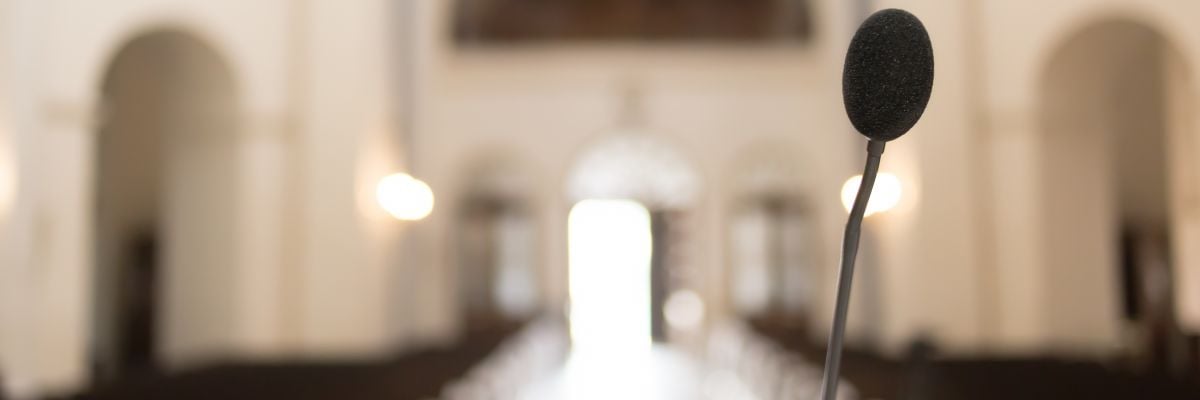
In 2019, America magazine published an article by Jean Molesky-Poz titled, “I’m a Catholic woman who was allowed to preach at Mass—until it was banned.”
The article describes how, in the 1990s, Molesky-Poz and other women in her parish began giving homilies at Mass. She was disappointed when, in 2001, the U.S. bishops issued a complementary norm that did allow women to preach—just not during the time reserved for the homily—at the discretion of the local bishop.
She was further disappointed in 2009 when this norm began to be enforced by the new bishop in her diocese. Still, the new bishop allowed women to preach, just not the homily.
In 2013, another bishop arrived, and he decided to discontinue lay preaching. Molesky-Poz and her fellows were again disappointed, but this was the bishop’s call.
After the America article, Fr. James Martin, S.J., weighed in on Twitter:
It is stupefying to me that women cannot preach at Mass. The faithful during Mass, as well as the presiders, are missing out on the wisdom, experience and inspired reflections of half of its members. St. Mary Magdalene, pray for us.
He then elaborated:
Just think. Women with PhDs in theology. Catholic sisters with decades of experience. Women spiritual directors. Authors. Mothers. Physicians. Attorneys. Teachers. Grandmothers. Women who work with the poor and marginalized. And on and on. The church needs their voices at Mass.
A vigorous discussion ensued, and, in the course of it, several important points were confused or ignored.
First, the whole issue was framed in terms of sex by both Molesky-Poz and Martin, which makes it sound as though the Church has something against women, when sex isn’t the issue: clerical status is.
Church law doesn’t forbid women from preaching the homily: it forbids laypeople from preaching the homily. This is one of the functions reserved to those who have holy orders (i.e., bishops, priests, and deacons).
It’s not the case, contrary to Fr. Martin, that half of the parish’s members can’t preach. Virtually all of its members can’t preach the homily. Only the priests and deacons can.
Lay men—including myself—cannot do so. If we set false modesty aside, I dare say that I could preach substantially better homilies than a large number of those I have heard. But I’m not resentful of the situation, because that’s not my function at Mass.
The issue isn’t just whether one has training in Scripture or public speaking. I’ve got those, as do many other people, and we can and do use them in a wide variety of contexts (Bible studies, faith formation classes, public lectures, etc.)—just not in the homily slot at Mass.
Priests and deacons are also trained in Scripture and public speaking, but they have something else: a special consecration and mission by virtue of their ordination.
It makes sense to have a special time in the liturgy for the ordained to preach, for as Scripture tells us:
The lips of a priest should guard knowledge, and men should seek instruction from his mouth, for he is the messenger of the Lord of hosts (Mal. 2:7).
Mass is when the faithful are gathered for the highest form of sacred worship, the Eucharist being “the source and summit of the Christian life” (Vatican II, Lumen Gentium 11). It makes all the sense in the world to have a special moment during Mass when those ordained to the ministerial service of God preach to the faithful.
That time is the homily.
So, as a layman who is just as prohibited from preaching the homily as Molesky-Poz, I understand the principles involved, and I don’t resent the situation.
I can use my training and talents by speaking in other settings. By the consent of the bishop of whatever diocese I happen to be in at the moment, I can even preach in church—just not the homily.
This brings us to a second point that got lost—again because Molesky-Poz and Martin downplayed it: the faithful can preach in church with the bishop’s permission.
Let’s look at what the Church’s law actually is. Molesky-Poz discusses how, in the 1990s, she and other women in her parish were allowed to preach the homily. But this wasn’t actually allowed in the 1990s. According to the 1983 Code of Canon Law:
Can. 766 The laity may be allowed to preach in a church or oratory if in certain circumstances it is necessary, or in particular cases it would be advantageous, according to the provisions of the Episcopal Conference and without prejudice to can. 767 §1.
Can. 767 §1 The most important form of preaching is the homily, which is part of the liturgy, and is reserved to a priest or deacon. In the course of the liturgical year, the mysteries of faith and the rules of Christian living are to be expounded in the homily from the sacred text.
Canon law thus prohibited laypeople from preaching the homily at the time. In 2001, the bishops followed up on the invitation in canon 766 to make provisions for lay preaching in churches and oratories—and that canon specifically prohibited them from allowing lay people to preach the homily.
The text of the 2001 complementary norm is online here. Among other things, it says:
If . . . it seems useful in particular cases, the diocesan bishop can admit lay faithful to preach, to offer spiritual conferences or give instructions in churches, oratories, or other sacred places within his diocese, when he judges it to be to the spiritual advantage of the faithful.
In order to assist the diocesan bishop in making an appropriate pastoral decision, the following circumstances and cases are illustrative: the absence or shortage of clergy, particular language requirements, or the demonstrated expertise or experience of the lay faithful concerned.
So, if you have expertise or experience that would benefit people, you can preach, by the permission of your bishop, just not during the homily slot.
Preaching any other time is fine, if your bishop says so (see Ecclesia de Mysterio, practical provisions, art. 3 §2). What’s more, laity can preach homilies in non-Eucharistic liturgies (ibid., 3 §4)!
Her bishop chose not to have lay preaching at Mass, but that’s not the case everywhere, which is a third thing she and Fr. Martin ignored. Martin says, “It is stupefying to me that women cannot preach at Mass.” He doesn’t add “in her diocese.” In other dioceses, they can, but Martin ignores this.
Even without lay preaching at Mass, Molesky-Poz continues to have an outlet for speaking in church. Toward the end of her article, she notes: “In our parish, we have formed a bi-monthly lecture, reflection, and discussion series, just for women.”
Any time a person is used to doing something and is then told not to, it can be disappointing. But if Molesky-Poz is knowledgeable about the Faith, she should understand the principles involved in having a moment of preaching reserved for those in ordained ministry, as I and other laypeople do, and that should enable her not to resent the situation.
What I find unhelpful is her—and Fr. Martin’s—tendentious framing of the issue in terms of divisive gender politics. That doesn’t help anybody. It would be better to bear in mind a few lines from St. Paul:
- All of us possess knowledge. Knowledge puffs up, but love builds up (1 Cor. 8:1).
- Love does not insist on its own way; it is not irritable or resentful (1 Cor. 13:5).
- Let us then pursue what makes for peace and for mutual upbuilding (Rom. 14:19).



